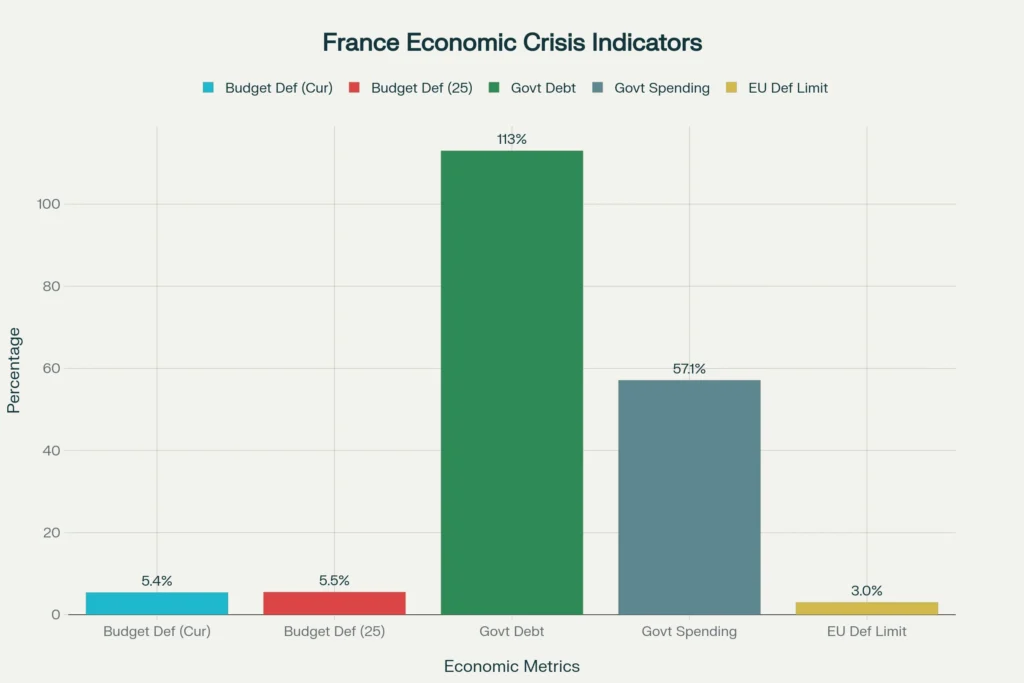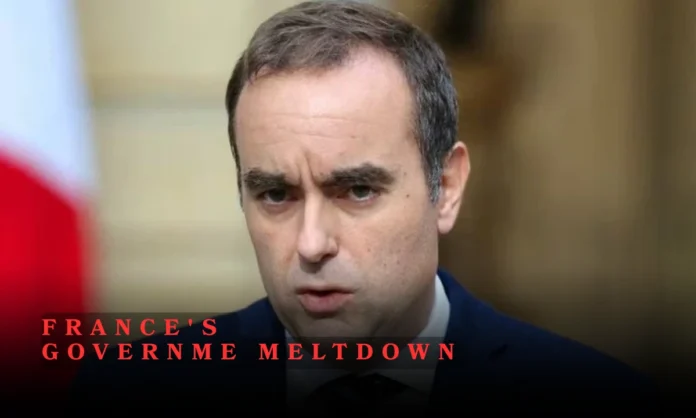Key Highlights:
- President Emmanuel Macron announced he will name a new French Prime Minister within 48 hours following Sebastien Lecornu’s resignation after just 26 days
- France’s budget deficit stands at 5.4% of GDP while government debt has reached 113% of GDP, creating urgent fiscal pressures
- Political instability has led to three prime ministerial resignations in one year, marking unprecedented governmental chaos in modern French history
Opening Overview
France confronts its most severe political turbulence in decades as President Emmanuel Macron prepares to appoint his sixth French Prime Minister in under two years. The announcement came after outgoing French Prime Minister Sebastien Lecornu resigned Monday following just 26 days in office, creating a record for the shortest-serving government in the Fifth Republic’s history. Lecornu’s departure intensifies pressure on Macron’s increasingly fragile presidency, with opposition parties demanding either snap parliamentary elections or the president’s resignation.
The crisis stems from France’s inability to pass crucial budget legislation amid a fragmented National Assembly where no single party holds a majority. With France’s budget deficit hovering at 5.4% of GDP and government debt reaching 113% of GDP, the nation faces mounting economic pressures that require immediate legislative action. The French Prime Minister position has become virtually untenable, as successive appointees struggle to navigate the complex parliamentary arithmetic needed to govern effectively.
Unprecedented Governmental Instability
The rapid succession of French Prime Minister appointments reflects France’s deepest constitutional crisis since the establishment of the Fifth Republic in 1958. Lecornu’s resignation marks the third French Prime Minister to leave office within a single year, following the departures of Michel Barnier in December 2024 and Francois Bayrou earlier in 2025. This governmental instability has created what analysts describe as a “structural crisis” that extends beyond individual personalities to the fundamental mechanics of French governance.
- Political fragmentation has left no party with sufficient parliamentary strength to form stable coalitions
- Opposition parties across the political spectrum have united in their rejection of Macron’s proposed budgets and reforms
The Elysee Palace confirmed that Macron granted Lecornu a 48-hour extension to negotiate with political factions before determining the next course of action. These last-ditch discussions aimed to establish what officials termed “a framework for action and stability for the nation,” though Lecornu ultimately concluded his “mission is now complete”. The French Prime Minister role has essentially become a revolving door, with each appointment facing immediate challenges from both opposition parties and erstwhile allies.
European partners have expressed growing concern about France’s political paralysis, particularly given the country’s central role in EU economic coordination. The repeated collapse of French governments has created uncertainty about France’s ability to meet European fiscal targets and maintain its leadership position within the eurozone.
Economic Pressures Driving Political Crisis
France’s fiscal challenges represent the underlying catalyst for the ongoing French Prime Minister crisis, with official government data revealing alarming budget dynamics. The country’s central government budget deficit reached EUR 157.5 billion by August 2025, though this represented an improvement from EUR 171.9 billion in the corresponding period of 2024. However, France’s debt-to-GDP ratio has climbed to 113% as of 2024, approaching levels that threaten the country’s creditworthiness and European Union compliance.
- Government spending accounts for 57.1% of GDP, among the highest ratios in the developed world
- The budget deficit is projected to reach 5.5% of GDP in 2025, well above European Union limits of 3%
Credit rating agencies have already begun downgrading France’s sovereign debt, with Fitch lowering the country’s rating from AA- to A+ in September 2025. Moody’s is expected to follow with additional downgrades by the end of October, reflecting investor concerns about France’s ability to implement necessary fiscal consolidation measures. These downgrades directly impact borrowing costs, making it more expensive for any future French Prime Minister to finance government operations and service existing debt obligations.
The economic implications extend beyond immediate fiscal metrics, as Goldman Sachs analysts project “budget slippage” will push France’s deficit to 5.5% of GDP while growth remains below trend. Bank of France Governor Francois Villeroy de Galhau warned that the next French Prime Minister must target significant deficit reduction, ideally keeping the shortfall within 4.8% of GDP in 2026. Without decisive action, France risks starting 2026 under a frozen budget extension, severely limiting policy flexibility for any incoming government.

Parliamentary Deadlock and Coalition Challenges
The fragmented composition of France’s National Assembly has created seemingly insurmountable obstacles for any prospective French Prime Minister seeking to build governing coalitions. No single party commands a majority following the inconclusive 2024 parliamentary elections, leaving Macron’s centrist alliance dependent on volatile partnerships with both conservative and left-leaning factions. This parliamentary arithmetic has repeatedly derailed budget negotiations, as opposition parties from both ends of the political spectrum unite in rejecting austerity measures proposed by successive governments.
- The far-right National Rally and far-left France Unbowed have formed tactical alliances to block government initiatives
- Centrist and conservative parties demand conflicting approaches to pension reform and social spending cuts
Lecornu’s brief tenure illustrated these coalition challenges, as his cabinet appointments faced immediate rejection from multiple parliamentary groups. The controversial nomination of former Finance Minister Bruno Le Maire as Defense Minister sparked particular opposition, forcing Le Maire to withdraw from consideration within hours of the announcement. These dynamics suggest that any new French Prime Minister will confront similar obstacles in assembling a viable government team capable of securing parliamentary confidence.
The prospect of snap parliamentary elections remains limited, as Lecornu reported during his final negotiations that most parties oppose dissolution of the current assembly. This political consensus against early elections reflects widespread recognition that the underlying parliamentary fragmentation would likely persist, potentially producing an even more ungovernable legislature. Consequently, the next French Prime Minister must navigate the existing parliamentary landscape while attempting to forge compromises among fundamentally incompatible political visions.
International Implications and European Concerns
France’s prolonged governmental instability has generated significant anxiety among European Union partners, particularly Germany, where officials worry about the future of Franco-German cooperation. As the eurozone’s second-largest economy, France plays a crucial role in EU economic coordination, making the repeated collapse of French governments a matter of continental concern. The inability to maintain a stable French Prime Minister undermines France’s capacity to participate effectively in European fiscal governance and climate policy initiatives.
- European Commission officials have expressed concerns about France’s ability to meet EU fiscal targets and climate commitments
- Germany’s government has privately questioned France’s reliability as a strategic partner in EU decision-making
The economic ramifications extend to currency markets, where the euro declined approximately 0.5% against the dollar following Lecornu’s resignation announcement. While analysts characterize this as a temporary reaction, prolonged uncertainty about the French Prime Minister position could weaken investor confidence in European assets more broadly. Credit markets have already begun pricing in higher risk premiums for French government bonds, reflecting doubts about the country’s fiscal trajectory under continued political instability.
International observers note that France’s crisis occurs amid broader challenges to democratic governance across Europe, making the resolution of the French Prime Minister question significant beyond national borders. The repeated failures to form stable governments raise questions about the adaptability of traditional parliamentary systems to increasingly fragmented political landscapes. Successfully appointing a French Prime Minister capable of governing effectively would demonstrate that democratic institutions can still function despite political polarization.
Closing Assessment
The appointment of France’s next French Prime Minister represents a critical juncture for both the country’s domestic stability and its international standing within the European Union. President Macron’s commitment to naming a successor within 48 hours reflects the urgent need to restore governmental functionality amid mounting fiscal pressures and parliamentary deadlock. However, the structural challenges that have felled three French Prime Ministers in the past year remain largely unchanged, suggesting that any new appointee will face similar obstacles in building sustainable governing coalitions.
The stakes extend far beyond immediate political considerations, as France’s economic trajectory depends critically on implementing credible deficit reduction measures that can satisfy both domestic constituencies and European partners. With government debt approaching 113% of GDP and the budget deficit exceeding 5% of economic output, the margin for continued political experimentation has effectively disappeared. The next French Prime Minister must therefore possess not only political acumen but also the technical expertise necessary to navigate France’s complex fiscal challenges while maintaining social cohesion.


